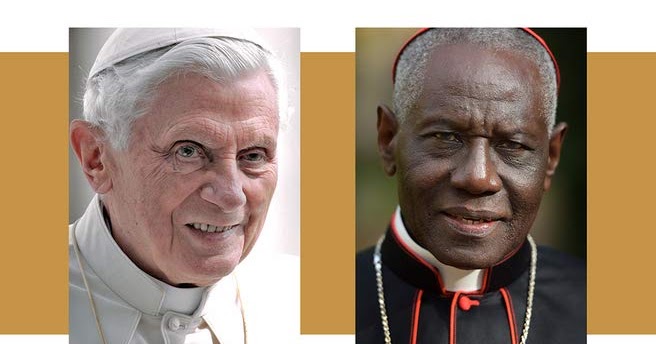A mini firefight emerged a few weeks ago when Cardinal Sarah published a little book along with Emeritus Pope Benedict. From the Depth of Our Hearts — Priesthood, Celibacy and the Catholic Church is indeed a heartfelt pleas from these two senior leaders in the Catholic Church. The controversy was whether Benedict XVI should be billed as a co-author or not. His is the shorter contribution, but it makes up almost half of the book, so the real problem people had with him being billed as co-author was that he was supposed to remain silent in his retirement.
The book was seen by some progressives as an attempt by Benedict to do what he promised not to: interfere with Pope Francis’ reforming (and therefore progressive) agenda. A few weeks later Pope Francis came out with his apostolic exhortation after the Amazonian synod which quashed the hopes of those who were pushing for women deacons and the ordination of married men in the Amazon.
Pope Benedict’s section of the book combines his usual in depth theological and Biblical observations with his own experience of ordination as a young man. The thrust of his argument is that the priest is wholly dedicated to God and that this total consecration, by definition, excludes marriage. He makes his case from church history and the Sacred Scriptures.
Cardinal Sarah builds on Benedict’s observations, again combining arguments from church history, canon law, the magisterium and his own unique experience growing up in Guinea as the child of parents converted by Catholic missionaries. He corrects the tendency to treat the priesthood as simply another job in a utilitarian manner and addresses the problem of clericalisation regarding the possible ordination of women to the diaconate. Cardinal Sarah speaks passionately and from his own experience of the church in the developing world and hits back hard against those liberals in the developed West who patronize indigenous Christians saying they “cannot understand celibacy” or argue that the discipline of clerical celibacy must be adjusted as part of the inculturation process.
This little book is an important contribution to much more thorough studies on the subject Cochini’s Apostolic Origins of Priestly Celibacy and Stickler’s The Case for Clerical Celibacy While I agree with the authors there was one point of argument which I found troubling. At one point Emeritus Pope Benedict seemed to be arguing that celibacy was part of the ontological dimension of the priesthood. If I am correct, this seems to be pushing the argument too far. The heart of the books argument is that the priest is totally dedicated to God and his ordination establishes a new ontological reality. Celibacy has always been seen as an adjunct to that reality–a practical discipline that helps make the total commitment a reality in the man’s life.
However, as we know, celibacy, in and of itself, does not bring about that total transformation and identification with Christ that is required of the priest and is begun and established ontologically through ordination. Celibacy can simply lead to a life of self indulgence, laziness, ease and comfort. Without proper support the demands of celibacy can also lead to loneliness, despair, private sin and a life that is rootless and alone. Like any discipline of the church, celibacy for the priest can lead to the sanctity and total, joyful identification with Christ and his mission, but it is not magic.
I write a man who, for seven years worked and lived as a celibate priest in the Anglican Communion. It was indeed liberating and I was able to live a simple apostolic life of service to Christ and his church. However, God led me to marriage and within marriage I learned new ways of self giving which complemented and enriched my life as a priest.
It is not for me to undermine the priestly discipline of celibacy. Indeed, I support it as the norm and the default setting, but I do wish there were more written and discussed about how marriage and ordination–both sacraments of service–might actually complement one another rather than conflict. In this crucial debate in the church I find it remarkable that no one in authority has actually stopped to ask the opinions and inquire about the feelings and explore the practicalities of the Catholic priesthood among those few hundred of us who are married priests.
I am grateful for Pope Benedict’s and Cardinal Sarah’s book and agree with Cardinal Sarah’s conclusion that what is needed in the church today are priests committed to a radical life of evangelization. I believe most of them should be celibate for the sake of the kingdom. But this presents a genuine contradiction. What if there were a married man and his wife and family –all of whom were enlivened and charged with this same radical, missionary spirit? What if that married man and his family were willing to go anywhere, live in poverty and serve God and his church in a joyful, radical and totally committed discipleship? Then what if that man and his family found themselves in a diocese where most of the celibate men were ensconced in cozy rectory houses with a rather easy going lifestyle, all expenses paid and everything taken care of?
The point I am making is that celibacy is a great gift to the church and a great discipline to foster total dedication to Christ, but it does not automatically produce the desired results and I can think of plenty of examples of married men and women who do, in fact, exhibit the radical discipleship evoked by Cardinal Sarah. This is not to say those men should necessarily be ordained as priests, but it is a reminder (which Cardinal Sarah writes about) that the laity too, are called to radical holiness and conformity to the image of Christ the Lord.







Leave A Comment
You must be logged in to post a comment.